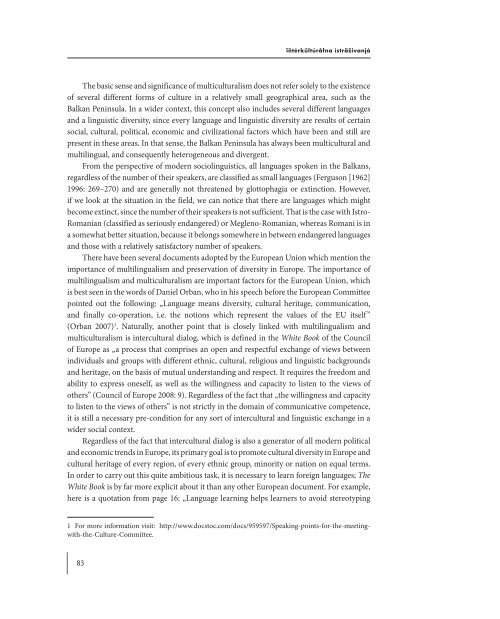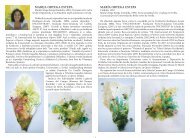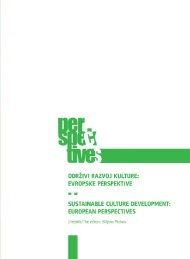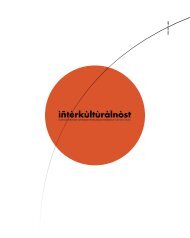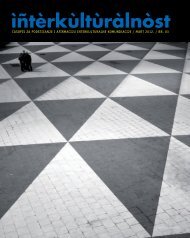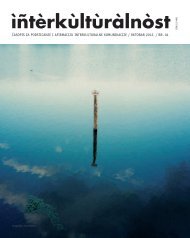Preuzmite kompletan Äasopis broj 2 u PDF formatu - Portal kulture ...
Preuzmite kompletan Äasopis broj 2 u PDF formatu - Portal kulture ...
Preuzmite kompletan Äasopis broj 2 u PDF formatu - Portal kulture ...
You also want an ePaper? Increase the reach of your titles
YUMPU automatically turns print PDFs into web optimized ePapers that Google loves.
ïñtérkûltúråłna ìsträživanjá<br />
The basic sense and significance of multiculturalism does not refer solely to the existence<br />
of several different forms of culture in a relatively small geographical area, such as the<br />
Balkan Peninsula. In a wider context, this concept also includes several different languages<br />
and a linguistic diversity, since every language and linguistic diversity are results of certain<br />
social, cultural, political, economic and civilizational factors which have been and still are<br />
present in these areas. In that sense, the Balkan Peninsula has always been multicultural and<br />
multilingual, and consequently heterogeneous and divergent.<br />
From the perspective of modern sociolinguistics, all languages spoken in the Balkans,<br />
regardless of the number of their speakers, are classified as small languages (Ferguson [1962]<br />
1996: 269–270) and are generally not threatened by glottophagia or extinction. However,<br />
if we look at the situation in the field, we can notice that there are languages which might<br />
become extinct, since the number of their speakers is not sufficient. That is the case with Istro-<br />
Romanian (classified as seriously endangered) or Megleno-Romanian, whereas Romani is in<br />
a somewhat better situation, because it belongs somewhere in between endangered languages<br />
and those with a relatively satisfactory number of speakers.<br />
There have been several documents adopted by the European Union which mention the<br />
importance of multilingualism and preservation of diversity in Europe. The importance of<br />
multilingualism and multiculturalism are important factors for the European Union, which<br />
is best seen in the words of Daniel Orban, who in his speech before the European Committee<br />
pointed out the following: „Language means diversity, cultural heritage, communication,<br />
and finally co-operation, i.e. the notions which represent the values of the EU itself ”<br />
(Orban 2007) 1 . Naturally, another point that is closely linked with multilingualism and<br />
multiculturalism is intercultural dialog, which is defined in the White Book of the Council<br />
of Europe as „a process that comprises an open and respectful exchange of views between<br />
individuals and groups with different ethnic, cultural, religious and linguistic backgrounds<br />
and heritage, on the basis of mutual understanding and respect. It requires the freedom and<br />
ability to express oneself, as well as the willingness and capacity to listen to the views of<br />
others” (Council of Europe 2008: 9). Regardless of the fact that „the willingness and capacity<br />
to listen to the views of others” is not strictly in the domain of communicative competence,<br />
it is still a necessary pre-condition for any sort of intercultural and linguistic exchange in a<br />
wider social context.<br />
Regardless of the fact that intercultural dialog is also a generator of all modern political<br />
and economic trends in Europe, its primary goal is to promote cultural diversity in Europe and<br />
cultural heritage of every region, of every ethnic group, minority or nation on equal terms.<br />
In order to carry out this quite ambitious task, it is necessary to learn foreign languages; The<br />
White Book is by far more explicit about it than any other European document. For example,<br />
here is a quotation from page 16: „Language learning helps learners to avoid stereotyping<br />
1 For more information visit: http://www.docstoc.com/docs/959597/Speaking-points-for-the-meetingwith-the-Culture-Committee.<br />
83


